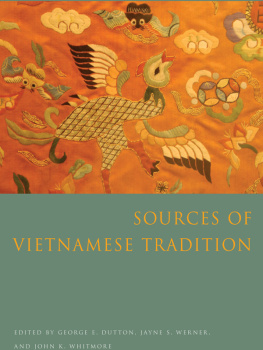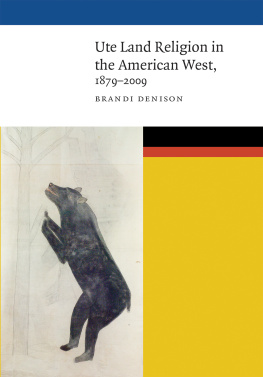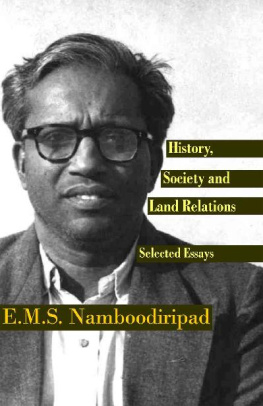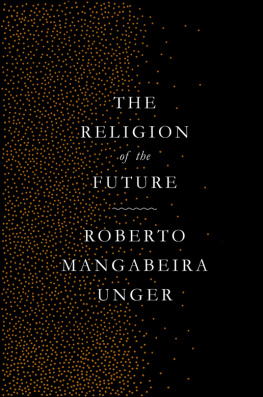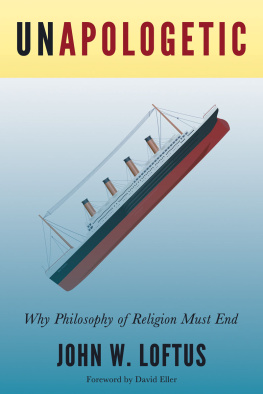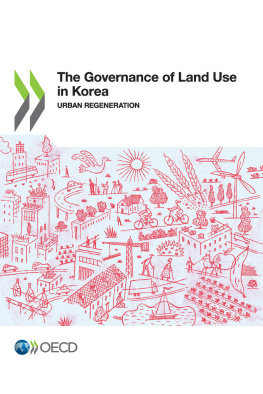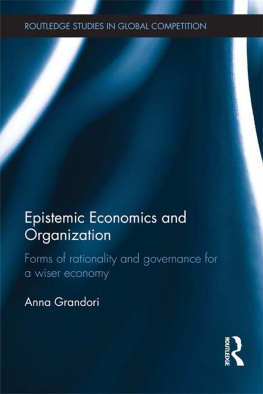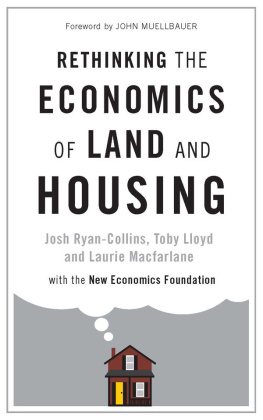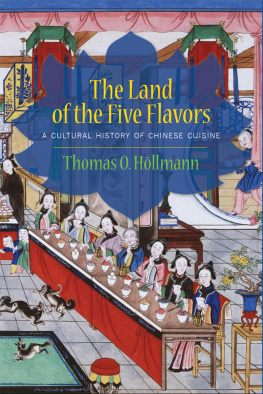Sources of Vietnamese Tradition
INTRODUCTION TO ASIAN CIVILIZATIONS
Introduction to Asian Civilizations
WM. THEODORE DE BARY, GENERAL EDITOR
Sources of Japanese Tradition,
1958; paperback ed., 2 vols., 1964. 2d ed., vol. 1, 2001, compiled by Wm. Theodore de Bary, Donald Keene, George Tanabe, and Paul Varley; vol. 2, 2005, compiled by Wm. Theodore de Bary, Carol Gluck, and Arthur E. Tiedemann; vol. 2, abridged, 2 pts., 2006, compiled by Wm. Theodore de Bary, Carol Gluck, and Arthur E. Tiedemann
Sources of Indian Tradition,
1958; paperback ed., 2 vols., 1964. 2d ed., 2 vols., 1988
Sources of Chinese Tradition,
1960, paperback ed., 2 vols., 1964. 2d ed., vol. 1, 1999, compiled by Wm. Theodore de Bary and Irene Bloom; vol. 2, 2000, compiled by Wm. Theodore de Bary and Richard Lufrano
Sources of Korean Tradition,
1997; 2 vols., vol. 1, 1997, compiled by Peter H. Lee and Wm. Theodore de Bary; vol. 2, 2001, compiled by Yngho Choe, Peter H. Lee, and Wm. Theodore de Bary
Sources of East Asian Tradition,
2008, 2 vols., edited by Wm. Theodore de Bary
Sources of Vietnamese Tradition
Edited by George E. Dutton, Jayne S. Werner, and John K. Whitmore

COLUMBIA UNIVERSITY PRESS
NEW YORK
Columbia University Press
Publishers Since 1893
New York Chichester, West Sussex
cup.columbia.edu
Copyright 2012 George E. Dutton, Jayne S. Werner, and John K. Whitmore
All rights reserved
E-ISBN 978-0-231-51110-0
Library of Congress Cataloging-in-Publication Data
Sources of Vietnamese tradition / edited by George E. Dutton, Jayne S. Werner, and John K. Whitemore.
p. cm.(Introduction to Asian civilizations)
Texts chiefly translated from Vietnamese, with some translated from Chinese and French; commentary in English.
Includes bibliographical references and index.
ISBN 978-0-231-13862-8 (cloth : alk. paper)
ISBN 978-0-231-13863-5 (pbk. : alk. paper)
ISBN 978-0-231-51110-0 (e-book)
1. VietnamCivilizationSources. 2. VietnamHistorySources. I. Dutton, George Edson. II. Werner, Jayne Susan. III. Whitmore, John K. IV. Title. V. Series: Introduction to Asian civilizations.
DS556.42.S69 2012
959.7dc23
2011033923
A Columbia University Press E-book.
CUP would be pleased to hear about your reading experience with this e-book at .
JACKET IMAGE: Detail of a badge, with a rooster, for third-rank civil official (silk- and metallic-thread embroidery), Vietnam, nineteenth century. (Dodi Fromson Collection; Maggie Smith Photography)
References to Internet Web sites (URLs) were accurate at the time of writing. Neither the editors nor Columbia University Press is responsible for URLs that may have expired or changed since the manuscript was prepared.
CONTENTS
With considerable trepidation we have undertaken a project that presumes to give substance to the conceptual sources of Vietnamese tradition. We are acutely aware that in these postmodern (or perhaps post-postmodern) times, to speak of tradition is to embark on a discussion sure to provoke criticism from all sides. We are equally aware that what a previous generation largely accepted as tradition can no longer be taken up without intense examination. Tradition, we acknowledge, is a concept invented, sometimes out of whole cloth, by scholars, politicians, religious leaders, and others to serve a wide range of agendas. Tradition is not the way things have always been, for there is nothing so constant as change, and it is ahistorical in the extreme to suggest otherwise. Under these circumstances, it is perhaps better not to speak of a single, much less fixed, tradition but to think of multiple ideational threads, sometimes marked by continuity and sometimes by rupture.
The works that we classify as part of the Vietnamese tradition are not meant to be exhaustive, nor are they intended to be canonical (though, of course, we recognize that their inclusion in this volume runs the risk of their becoming so). Rather, and much more modestly, the excerpts in this anthology reveal some of the ways in which peoples living in the Vietnamese lands thought and wrote about their society over nearly two millennia. Any effort to understand the Vietnamese people must begin by thinking in a series of sometimes imperfect dichotomies that define elements of their cultural heritage. These binaries include mountains and seas, China and Southeast Asia, war and peace, rice farming and trade, Buddhism and Confucianism, lowlands and uplands, men and women, scholars and soldiers. Among and between these dichotomous pairs, some geographical and others conceptual and even spiritual, we find the Vietnamese people. Although their heritage is confusing, it also is rewardingly heterogeneous, one whose essence cannot be distilled into a single volume or two. Because the sources of their tradition are many, they do not flow in a single stream but combine multiple streams to create admixtures viewed as authentic or traditional. Both Vietnamese and non-Vietnamese scholars have long sought to reconcile these many sources, complex and sometimes antagonistic histories, into coherent narratives. Such efforts have sometimes served the purposes of the state, justifying their political actions, and sometimes they have enabled rulers to sway popular sentiment. These efforts themselves have shaped the understandings and meanings of the past, as court histories have been borrowed piecemeal by local historians and literati to produce particularistic visions of the past and its heritage. As one scholar noted, it is perhaps better to make the past strange so as to prevent its being used as a weapon by one side or another. Our sincere hope is that this volume will not be seen as a weapon or justification for exclusive interpretations of the origins of the Vietnamese people. Rather, our intent is to contribute to a better understanding of a cultural heritage that is still appreciated only dimly by most outside that country.
This is why, despite the numerous challenges, this book seems all the more necessary and, indeed, long overdue. The lack of such a volume was particularly glaring given the rapid development of the field of Vietnamese studies over the past decade in both Vietnam and the West. In addition, despite a decade-long lull following the end of the Vietnam War, Vietnamese studies has recently enjoyed a resurgence in the United States, with scholarly exchanges and research between the United States and Vietnam similarly expanding and flourishing. New research has generated new understandings of crucial periods, turning points, and conceptual frameworks in Vietnamese history. In the course of this rapidly evolving scholarship, new texts have emerged to enrich or revise our insights into, and understanding of, the Vietnamese past. In addition to the many known historical texts, new texts are being added to the canon. This book reflects these advances.
Many people contributed to the gestation, support, and preparation of this book. Wendy Lochner, senior executive editor at Columbia University Press, first proposed to Jayne Werner the idea of including Vietnam in the Introduction to Asian Civilizations series. Jayne Werner then asked John Whitmore and George Dutton to join her as coeditors. All three of us have been hampered by the lack of teaching materials in the form of readily accessible translations and textbooks for classroom use, and when we launched the project, we realized we faced a time-consuming task. We asked the Henry Luce Foundation for support for the project, having been encouraged to do so by officers of the foundation and also by David J. Steinberg, president of Long Island University and a noted scholar of Southeast Asia. We are very grateful to Dr. Terrill E. Lautz, vice president and secretary of the Henry Luce Foundation, for his intervention and personal interest in this project. Because he had served in Vietnam in the U.S. Armys Medical Service Corps from 1969 to 1970, he consequently had more than a passing interest in and appreciation for our project.
Next page
